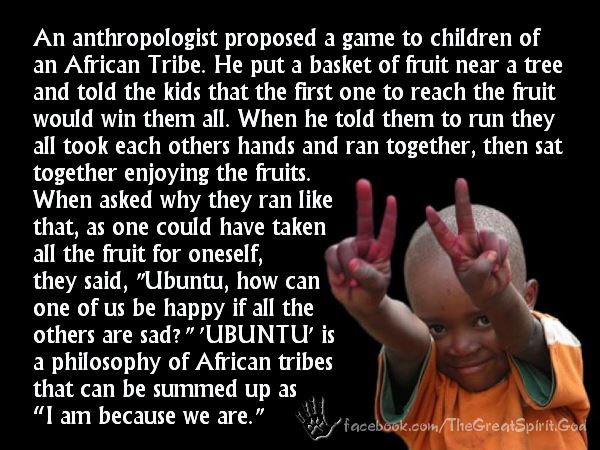

This is a quick way to get burnt out and lose our connection with others. We’re often told to hustle hard, and not burden others with our problems. Western and American cultures often have us look the other way – self reliance, independence, be the first and best. When we live with ubuntu, we acknowledge that a key part of the human experience is our relationships with, and reliance on, other people. Ubuntu speaks to the idea of collective humanity. A meaningful and well-lived life is enjoyed by supporting and being supported by others. If you can take one thing away from the concept of Ubuntu and apply it to daily life let it be this: No person is an island. Let’s see how you can use Ubuntu to inspire a mindset shift.

But what would it mean to apply this concept to your daily life?īelow I’ve outlined some of the many ways you can apply the Ubuntu philosophy to your day-to-day thinking. Using Ubuntu Philosophy in Daily LifeĪs we can see, the concept of Ubuntu is a wide-reaching one, able to apply to political concepts and philosophical modes of thought. He ruled with the principle that leadership comes from a place of peace for humanity, and a focus on working to help heal a greater whole through cooperation, connection, and community. As a part of his leadership, he often relied on the concept as he helped post-apartheid South Africa unify. Nelson Mandela also famously spoke from this concept. When you live with Ubuntu, you live in a way where you are open to others and know that by helping others you become a richer human as well. This provides another angle on the philosophy of Ubuntu. Recently, Desmond Tutu popularized this philosophy in his book No Future Without Forgiveness, In this book, he describes someone with Ubuntu as a person who is “open and available to others, affirming of others … has a proper self-assurance.” Its roots are in African humanism, focused on the idea that community is the basis of society, and the idea of collective humanity defining us as human beings. The concept of Ubuntu has an interesting history, having been adopted by many thinkers and philosophers in its lifetime. On paper, this all sounds quite simple, but putting it into practice isn’t always easy. In this mindset, the thing humanity needs to prioritize are the ways we treat each other. It says that your humanity is formed through relationships, making how we relate to and treat one another vital to our essence. Ubuntu is asking you to view yourself not as an individual, but part of a group. This is notable, because it shifts the focus away from the individual, and towards the collective. Ubuntu asks us to reflect on how we exist as a collective, and how much of the self (your own humanity, your own personhood) is formed through how we relate to others. That we live as a shared humanity, and our human-ness comes not from individual experiences, but our relationships. In essence, this ethic tells us that we find identity through our relationships with one another.

Let’s dive deeper into the definition of Ubuntu a little bit more to appreciate the complexity and depthfulness of the term.Īs we touched on above, the most widely accepted definition comes from a Zulu phrase that teaches us that human beings are human beings because of their relationships with other human beings. And, like all philosophy, it can help us better unpack the workings of our lives, and learn lessons about the truths of ourselves.

It can be used as a moral theory when debating anything from human rights to apartheid to basic human dignity.Īfrican philosophy is rooted in a deep and complex tradition of morals and ethics. Though this definition sounds simple at first, it represents a mode of African humanism ( a mode of humanism rooted in the belief that no human being is superior to another) and an evolving political philosophy that can get complex when you break it down. This phrase, “ Umuntu ngumuntu ngabantu” translates roughly to “a person is a person through other people.” While the concept has many different definitions and translations, the most popular definition comes from a Zulu phrase. The word Ubuntu is nothing new, with references to it being found as far back as 1846. Let’s start at the beginning: What is Ubuntu? And what does it mean? Let’s dive in and learn more! What Is Ubuntu? While it has been around for centuries, it was largely popularized in Southern Africa by Nelson Mandela, who gave the concept the international reach it has achieved today.īut what exactly is Ubuntu? What does it mean? And what can humanity learn from this concept? The Ubuntu ethic is a philosophy born from African philosophy. If you ask someone from South Africa to define the African Ubuntu philosophy they’d have plenty to say! But ask the average North American, and you’ll probably find a whole lot of head-scratching.


 0 kommentar(er)
0 kommentar(er)
